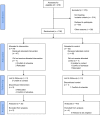Culturally tailored, family-centered, behavioral obesity intervention for Latino-American preschool-aged children
- PMID: 22869834
- PMCID: PMC4074623
- DOI: 10.1542/peds.2011-3762
Culturally tailored, family-centered, behavioral obesity intervention for Latino-American preschool-aged children
Erratum in
-
Barkin SL, Gesell SB, Po'e EK, Escarfuller J, Tempesti T. Culturally Tailored, Family-Centered, Behavioral Obesity Intervention for Latino-American Preschool-aged Children. Pediatrics. 2012;130(3):445-456.Pediatrics. 2019 Jun;143(6):e20190813. doi: 10.1542/peds.2019-0813. Pediatrics. 2019. PMID: 31160514 Free PMC article. No abstract available.
Abstract
Objective: To test the effect of a culturally tailored, family-centered, short-term behavioral intervention on BMI in Latino-American preschool-aged children.
Methods: In a randomized controlled trial, 54 parent-child dyads were allocated to the intervention and 52 dyads were allocated to an alternative school-readiness program as the control condition. Parent-child dyads were eligible if the parent self-defined Latino, was at least 18 years old, had a 2- to 6-year-old child not currently enrolled in another healthy lifestyle program, had a valid telephone number, and planned on remaining in the city for the next 6 months. The Salud Con La Familia (Health with the Family) program consisted of 12 weekly 90-minute skills-building sessions designed to improve family nutritional habits and increase physical activity. Both programs were conducted in a community recreation center serving an urban neighborhood of mostly Spanish-speaking residents.
Results: Forty-two percent of participating preschool-aged children were overweight or obese. Controlling for child age, gender, and baseline BMI, the effect of the treatment condition on postintervention absolute BMI was B = -0.59 (P < .001). The intervention effect seemed to be strongest for obese children.
Conclusions: A skills-building, culturally tailored intervention involving parent-child dyads changed short-term early growth patterns in these Latino-American preschool-aged children. Examining long-term effects would be a prudent next step.
Trial registration: ClinicalTrials.gov NCT00808431.
References
-
- Wang Y, Lobstein T. Worldwide trends in childhood overweight and obesity. Int J Pediatr Obes. 2006;1(1):11–25 - PubMed
-
- Ogden CL, Carroll MD, Curtin LR, Lamb MM, Flegal KM. Prevalence of high body mass index in US children and adolescents, 2007-2008. JAMA. 2010;303(3):242–249 - PubMed
-
- Singh AS, Mulder C, Twisk JW, van Mechelen W, Chinapaw MJ. Tracking of childhood overweight into adulthood: a systematic review of the literature. Obes Rev. 2008;9(5):474–488 - PubMed
-
- Birch LL, Fisher JO. Development of eating behaviors among children and adolescents. Pediatrics. 1998;101(3 pt 2):539–549 - PubMed
Publication types
MeSH terms
Associated data
Grants and funding
LinkOut - more resources
Full Text Sources
Medical


